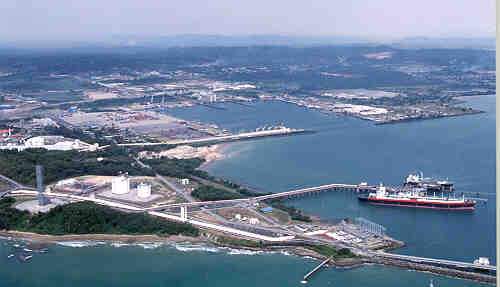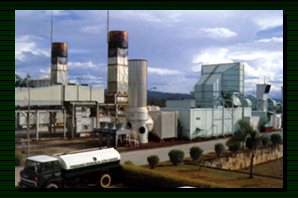DAIKEN SARAWAK SDN BHD - MEDIUM DENSITY FIBREBOARD (MDF) PLANT
Daiken Sarawak Sdn. Bhd. was incorporated in February 15, 1994 as a Malaysia and Japanese joint venture company. The existence of this company is in line with Sarawak State Government's Policy for Global Environment concern by adopting an efficient method to reduce the rapid deterioration of its timber resources.
Daiken Sarawak Sdn Bhd
(PS/289716-D)
No. 2069, Jalan Tanjung Kidurong,
Kidurong Light Industrial Estate,
97300 Bintulu,
Sarawak.
Telephone : 6 086 251000 Fax : 6 086 252803
Website - None provided
Email - none provided
Top
BINTULU CEMENT PLANT - CLINKER GRINDING PLANT
The Bintulu Cement Plant is the second cement plant in Sarawak constructed by CMS Cement. The first one is the Pending Cement Plant in Kuching.
The construction of the plant is vital to the rapid industrialisation taking place in the state.
The Bintulu Cement Plant situated at the Kidurong Industrial Estate was built at a cost of RM137 million. This plant which is manned by only 40 highly skilled workforce is capable of producing both Ordinary Portland Cement and Portland Blast Furnace Cement. With its annual production capacity of 750,000 MT, the Plant will ensure adequate supply of cement in the Northern Region of Sarawak for the next 10 years.

CMS Plant
Top
BINTULU DEEPWATER PORT

This all-weather port started operations on January 1, 1983. It is the first deepwater port in Sarawak and one of the pots in Malaysia equipped with state-of-the-art technology including the Vessel Traffic Management System (VTMS) and the Vessel Traffic Surveillance (VTS) System.The composition of cargo at Bintulu Port has been changing rapidly in the recent years in accordance with the structural transformation of the economic and industrial development of its hinterland. From a port developed to serve the LNG trade, Bintulu Port has responded to the demands of a growing variety of cargo. The port handles a growing volume of general cargo, liquid bulk, dry bulk and containerised cargo. In 2000, Bintulu Port handled 24.89 million tonnes of cargo. For containerised cargo, Bintulu Port recorded a container throughput of 47,609 TEUs in 2000. The port handled 4,047 vessel calls in 2000.
Top
PALM OIL REFINERY & FRACTIONATION PLANT
Bintulu Edible Oils Sdn. Bhd. is the first of its kind in Sarawak and was constructed in June 1991 for about RM18 million. In December 2000, following a restructuring exercise and the merger of edible oil refining operations of the Group, the current equity structure is PGEO Group Sdn. Bhd. (86%) and Austral Enterprise Berhad (14%)I
The refinery has a daily production capacity of 1,800 mt/day while the fractionation plant has 1250 mt/day. Its is located in Kidurong Industrial Area and operation commenced in July, 1992.
SESCO'S COMBINED CYCLE POWER PLANT
Syarikat SESCO Berhad, formerly known as Sarawak Electricity Supply Corporation (SESCO), was privatised in 2005. It is responsible for the generation, transmission and distribution of electricity in Sarawak. It also conducts training and other related businesses in support of its core operations.
Today, it joins forces with other subsidiaries of Sarawak Energy to deliver efficient services and uninterrupted electrical supply to the people.

Top
GLUE/ADHESIVE FACTORY
Built at a cost RM17 million, the factory is owned and operated by Bintulu Adhesive & Chemical Sdn. Bhd.
It produces urea formaldehyde resin, phenol formaldehyde resin and low formaldehyde emission for plywood and chipboard manufacturing. Urea precondensate is also produced for the Asean Bintulu Fertilizer (ABF) Plant.
The setting up of the adhesive factory has proven to be a boom for the ABF plant as well as the timber-processing factories at the wood-based Kemena Industrial Estate (KIE).
Top
PLANTATION & AGROBASED PROJECTS
Following the opening up of land along the Bintulu-Miri Road in the mid 1970s, the Sarawak Land Development Board and Commonwealth Development Corporation had started large-scale plantations within Bintulu Hinterland area, whereby more than 20,000 hectares of oil palm and another 1,000 hectares of cocoa have been developed.
This was followed by the opening up of an other 9,900 hectares by Saremas Sdn. Bhd. and 4,000 hectares by Bintulu Lumber Sdn. Bhd. in the late 1980s both for the development of oil palm estates. The other oil palm plantations include Sarawak Pulp Industries Sdn. Bhd. with a total area of 7,300 hectares and Imbok Enterprise Sdn. Bhd. with an area of 11,400 hectares. Kerasa Sdn. Bhd., being allocated an area of 2,000 hectares, is developing a rattan plantation.
So far, about 57,740 hectares have been cultivated with oil palm, 2,000 hectares with rattan and 815 hectars cultivated with pepper in the Bintulu Hinterland.
Top